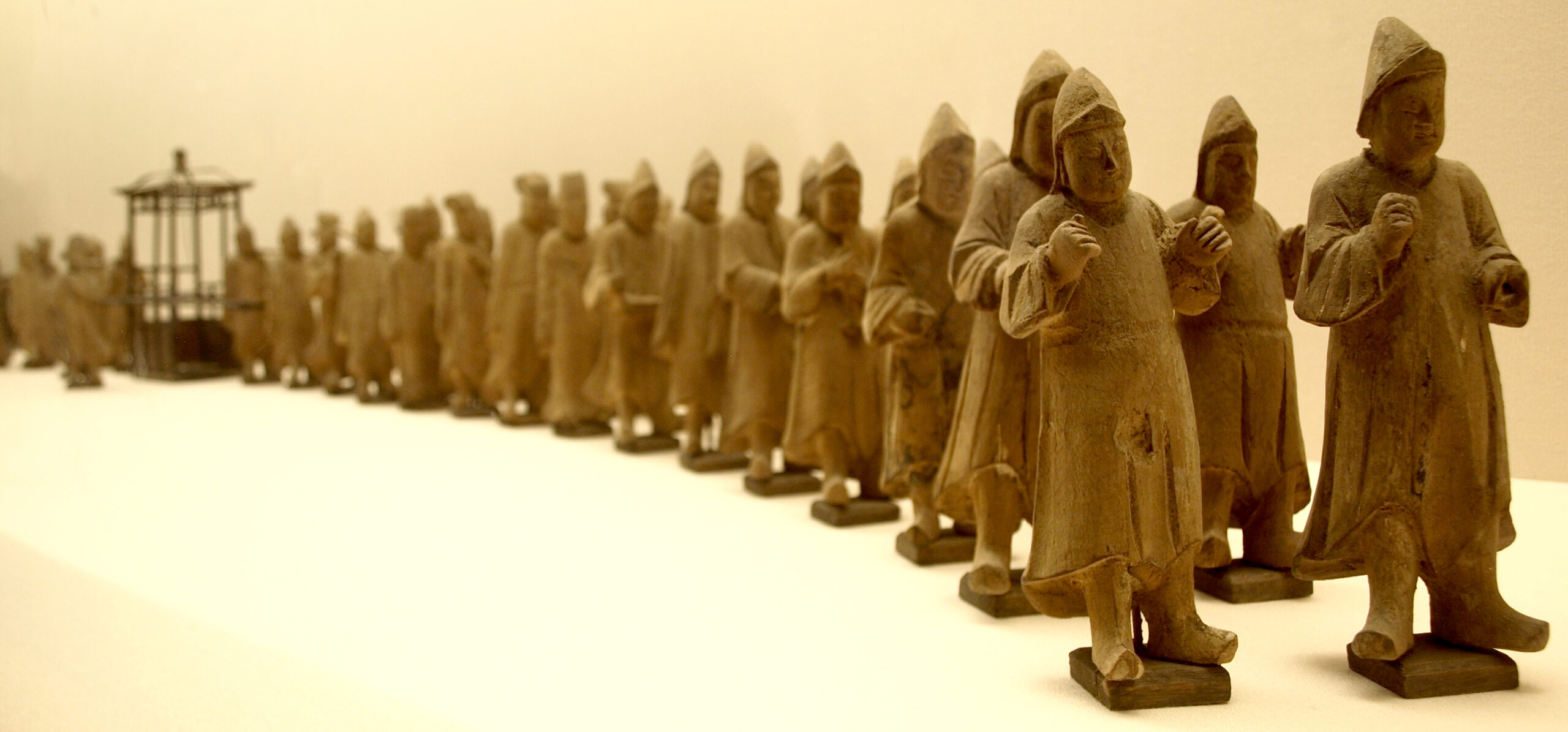A look at governance in premodern societies might help us better comprehend the attack on the Capitol last week, writes Sam Pizzigati.

Pro-Trump protesters around the Capitol on the evening of Jan. 6. (Tyler Merbler, CC BY 2.0, Wikimedia Commons)
By Sam Pizzigati
Inequality.org
 How best to understand the assault on the Capitol last week? Might some historical perspective help us better comprehend how endangered our democracy has become? Could that perspective point us to a more promising post-Trump path?
How best to understand the assault on the Capitol last week? Might some historical perspective help us better comprehend how endangered our democracy has become? Could that perspective point us to a more promising post-Trump path?
A global team of anthropologists from the United States and Mexico may be offering up just the sort of historical perspective we need.
The team’s newly published research — on premodern societies — might at first glance seem more than a bit irrelevant. Wednesday’s mob violence has Americans by the millions, after all, worried about “democratic backsliding.” But we had no democratic nation states in premodern times. So how could the experiences of premodern states help us overcome today’s Trumpism, in any of its manifestations?
Premodern states, counter the four anthropologists who’ve authored “Moral Collapse and State Failure: A View from the Past,” actually have plenty of relevance for us today — if we dare acknowledge our “presentist” bias, the assumption that our modernity represents “a radical departure” from earlier, less evolved societies “dominated by self-interested authoritarians whose political power and divine status” stood as “bulwarks against good government reform.”
Please Contribute to Consortium
News‘ Winter Fund Drive
In fact, explain Purdue University’s Richard Blanton and his colleagues, premodern states at various times adopted “practices and policies of good government similar to modern democracies.” We can compare these societies to our own — and learn from them.
Good Governance in Premodern States
Blanton’s team includes the Field Museum Integrative Research Center’s Gary Feinman, the University of Georgia’s Stephen Kowalewski and the Instituto Politécnico Nacional’s Lane Fargher in Mérida, Mexico. The four have scoped out some 30 premodern political states, looking for those elements of “good government” practice most relevant to our politics today.
Among those elements: “the governing capacity and willingness to accommodate citizen voice,” a fair judiciary, and an equitable tax system. How many premodern states, the researchers also asked, provided public goods that people valued? Identified and punished those in authority who benefited privately from state resources? Had leaders who accepted limits on their power — and could be, in some way, “impeached” for violating those limits?
Overall, the four anthropologists found just four premodern states that rate well on all these attributes of “good government.” But those of us in the modern world, they caution, have no reason to feel particularly smug about that meager total. Even today, the researchers note, only “a minority of nations” can give a robust “yes” to the basic attributes of good governance.
The four premodern “good government” states that these researchers identified — China’s Ming Dynasty, the Mughal empire in South Asia, the Roman High Empire, and the Republic of Venice — all endured for long periods and delivered broad prosperity. They all eventually also collapsed. Blanton and his colleagues dive into case studies to explain why.
Ming Dynasty

Processional figurines from the Shanghai tomb of Pan Yongzheng, a Ming dynasty official. (Captmondo, CC BY-SA 3.0, Wikimedia Commons)
The Ming Dynasty, founded in the late 14th century by an emperor of peasant origins, saw itself as fulfilling the promise of Confucian philosophy and enhancing “the state’s ability to serve the general good of society.” The dynasty had the “institutional capacity to field complaints from citizens” and “assure equitable taxation.” State-sponsored community granaries “buffered families against food shortages and overpricing by grain merchants.”
Emperors, for their part, faced prohibitions against “enriching themselves.” Citizens expected them to behave frugally and selflessly. But that behavior would break down over the course of the 16th century. Citizens lost confidence in their rulers, and their rulers found themselves increasingly unable to control corruption in their administrative ranks.
That corruption, in turn, reduced revenues for public goods. The ranks of the destitute burgeoned. Food production nosedived. The Manchus invaded from the north. In 1644, they ended Ming rule.
Venetian Republic

Chamber of the Great Council in Venice, 2011. (Rino Porrovecchio, CC BY-SA 2.0, Wikimedia Commons)
Another example: the Venetian Republic that emerged in the 12th century. The prominent families that made up Venice’s ruling “Great Council” recognized “the importance of social cohesion for the success of the society.” They saw grand private fortune as an invitation to the “political corruption that can threaten community solidarity” and created a government “capable of addressing citizen concerns.” They removed from office those who violated the public trust.
That same government provided far more in the way of public goods than any other European state, everything from street lighting and food security to public education and relief for society’s most vulnerable. All these arrangements lasted into the 17th century, until Venice saw “a gradual decline in commitment to key principles and a hardening of the divide between wealthy and poor.”
Lesson for Our Time
Rome and the Mughal empire have similar stories to tell. The lesson for our time? Good government demands “checks on power, a distribution of voice, ways to police corruption, equitable fiscal financing of the state, limits on greed, and leadership dedicated to public service.” These qualities all erode when societies let wealth concentrate. Leaders lose their way. Citizens lose trust. Collapse, at that point, comes quickly.
“Societies … are fragile human constructs that can fail.”
“Our findings provide insights that should be of value in the present,” notes Purdue’s Blanton, “most notably that societies, even ones that are well governed, prosperous, and highly regarded by most citizens, are fragile human constructs that can fail.”
His team sees the United States hovering on the brink of that failure, with more and more citizens perceiving — amid “the growing influence of wealthy individuals and interest groups” — that “they have little stake in what should be a democratic society.”
America’s “U-turn over the last five decades in wealth and income inequalities,” these anthropologists conclude, continues to compound this “decline in citizen confidence.” The nation’s leaders have embraced “a new ethos” that elevates “shareholder value, personal freedom, nepotism, cronyism, the comingling of state and personal resources, and narcissistic aggrandizement in ways rarely seen in the early history of our Republic.”
The sixth day of 2021, the New York Times editorialized the morning after the Trump-incited assault on the Capitol, “will go down as a dark day” in U.S. history and raises the question whether “America is at the beginning of a descent into an even darker and more divided epoch or the end of one.”
The work of the researchers behind “Moral Collapse and State Failure” suggests a simple answer: Our descent into darkness will not end until our descent into ever greater levels of inequality begins — finally and significantly — to reverse.
Sam Pizzigati co-edits Inequality.org. His latest books include The Case for a Maximum Wage and The Rich Don’t Always Win: The Forgotten Triumph over Plutocracy that Created the American Middle Class, 1900-1970. Follow him at @Too_Much_Online.
This article is from Inequality.org.
The views expressed are solely those of the authors and may or may not reflect those of Consortium News.
Contribute to Consortium
News‘ Winter Fund Drive



Very good, thought-provoking article – I especially like the coining of the word “presentism” to refer to denigration of past systems and philosophies in comparison with our current “democratic” system, even though this system may be democratic in name only, while in reality highly oligarchic or even kleptocratic.
It’s also appropriate that the Roman High Empire is cited as an example of particularly good governance. I assume the author means by this the period of the “five good emperors”, the Nerva-Antonine dynasty through Marcus Aurelius.
Recently I read the “Meditations” of Marcus Aurelius. and I’m convinced there is no political leader alive today with his intellectual depth, good will and abilities.
In these writings, for example, Marcus Aurelius called for “a balanced constitution, a commonwealth based on equality and freedom of speech, and a monarchy which values above all the liberty of the subject”. Sound familiar?
Compare this with the caricatures of the Roman Empire one reads about these days, even from serious commentators, which resemble Asterix and Obelix much more than the august reality.
In “Collapse : How Societies Choose to Fail or Succeed” by Jared Diamond, the author goes extensively over a number of ancient societies that have completely collapsed. Significantly among the numerous causes were: concentration of resources to the upper levels of the populous; environmental degradation, mainly using up and squandering available resources in their area. These were the most significant other than invasion of other groups. Among environmental issues was deforestation.
Among those elements: “the governing capacity and willingness to accommodate citizen voice,” a fair judiciary, and an equitable tax system.
Sam knows better than any of us how far away from this is the “modern, democratic” USA.
We think we are advanced, but only in certain directions.
“How best to understand the assault on the Capitol last week?”
The stated assumption that there was an assault is unsupported and according to a large body of proof, baldly false.
The cops invited dupes and agent – provocateurs into the building. Trump was still speaking at that time. Subsequently a cop shot and murdered a lady.
Trump told everybody to be peaceful and go home. He “incited” nothing.
Properly understood what happened was Machtergreifung.
And what follows that?
Gleichschaltung.
Which is what the article serves up.
Not, mind you all, that I would object. I am just as happy to have Mr 10% and the Lady of vaulting ambition (and little else) as have Trump the Clueless as titular leader of a collapsing empire.
Never bother the enemy when he’s busy making stupid mistakes. Of course they never make mistakes, do they?
Quiz Friday. We shall discuss how MacBeth’s failure provides a model to understand both Machtergreifung and Gleichschaltung, and how these processes failed. Extra Credit! Discuss how these processes worked for Stalin and Hitler, and how these too ultimately failed.
There are three things that get lost in the current debate.
First, our Capitol is not a sacred cathedral of democracy. Rather it is a sleazy brothel where our elected officials sell themselves to the highest bidder.
Second, the Congress continues to have an approval rating hovering around single digit.
Finally, multiple studies have shown that our government’s policies have close to zero correlation with the popular wish.
Combine these three things with what the author is saying and you’ll understand how far down we are already in the abyss.
I repeat my comment to a previous article.
It must be obvious by now that the whole world is recalibrating or redefining the meaning of “Democracy”. I believe there are no two countries on Earth with the same system of vote counting, let alone the same system of involving public participation in decision making. There is not even a common consensus about whether “Democracy” means acknowledging EVERY voice and opinion, or if it means establishing the MAJORITY voice and opinion, or even by what MARGIN a majority is considered legitimate.
Rule by the loudest, by the richest, or by the rudest, is being contested, and I believe PARTICIPATION in public affairs will ultimately define “Democracy”, rather than the current WINNING of privileges.